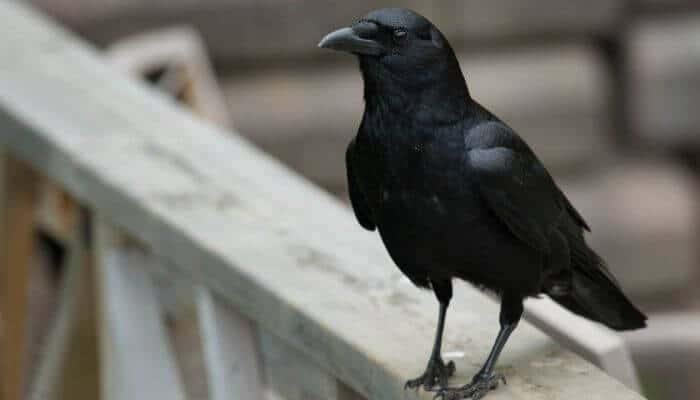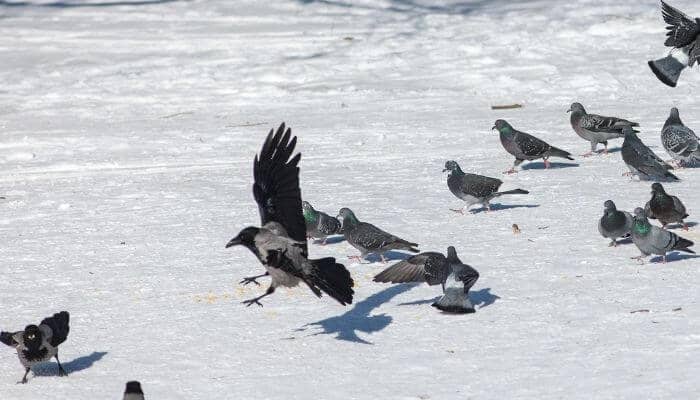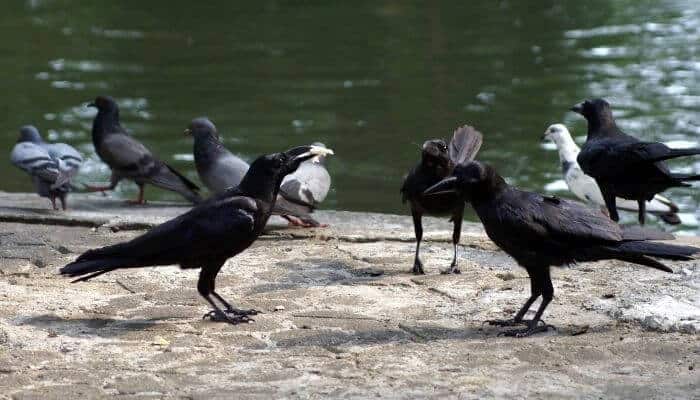In terms of the general hierarchy of bird life, it is a fact that crows have been known to hunt, kill and consume pigeons.
By their nature, crows are incredibly opportunistic birds, and unfortunately for pigeons, that means taking the opportunity to eat them simply due to their relative abundance in a vast majority of areas.
Pigeons make rather easy prey for crows, especially in areas where scavenging is high due to amounts of food in the streets.
Crows might not be the classic, usually aggressive type of bird, but when circumstances require it, they certainly can, and will, kill and eat a pigeon as part of their natural diet.
They are classed as predatory birds, after all.
About Crows
The crow belongs to the genus Corvus. Corvus refers to a group of medium to large-sized birds within the family
Corvidae, and this includes species that are commonly known as rooks, ravens and, of course, crows!
All in all, there are around 45 members of the Corvus genus, and they can be found natively on all temperate continents with the exception of South America.
The crow accounts for approximately one-third of the species within the Corvidae family.

Interestingly, something that sets crows and other Corvus’ apart from other birds is their capacity for special intelligence.
Research conducted over the years has highlighted the fact that crows are capable of tool use, as well as even more impressive tool construction.
In fact, crows are currently considered to be one of the world’s most intelligent animals!
Why Do Crows Eat Pigeons?
As we mentioned briefly above, crows are likely to eat pigeons simply out of opportunism.
It might not be in their nature to choose a pigeon above all other options but have no doubt that if a crow is hungry, hunting and out of first choices, then a pigeon will certainly be on the menu.

If a crow spots a pigeon that appears to be injured, stuck in any way or young and without the protection of its mother, then it will most likely take the opportunity to attack.
Pigeons that are tame and also pigeons that have become complacent in locations like urban spaces and squares, are often most susceptible to the attacks of crows.
So if a pigeon isn’t number one on the menu for crows, what is? Here is a brief list of what a crow’s normal diet might contain:
- Grains
- Seeds
- Nuts
- Fruits
- Berries
- Insects
- Small mammals such as mice.
- Easily accessible aquatic animals like shallow-dwelling fish, young turtles, mussels, clams, crayfish.
- Eggs and nestlings of species inducing robins, terns, loons, jays, sparrows and eider ducks.
How Do Crows Hunt Pigeons?
Some people find it unusual that crows would choose to hunt pigeons given their relatively similar size, but there are a number of different reasons why the crow has the advantage in a game of cat and mouse (so to speak!).
Crows have the upper hand on pigeons thanks to a beak that nature has designed to be able to cut and rip flesh.
Unfortunately for pigeons, pigeon beaks are more suitable for humble tasks like picking up grain.

This mismatch in beak strength and design means that a pigeon is virtually unable to defend itself against the ferocity of a crow’s finer-tuned hunting instincts.
Alongside their killer beaks, crows also have claws that are perfect for gripping and holding on to prey.
Pigeons, on the other hand, have claws that are best suited for simply perching.
When compared with one another, there is only one winner in the claw department!
The way a crow hunts is also an advantage.
Crows like to creep up behind the pigeon.
The pigeon sensing its presence would turn face to face to the crow which would immediately begin to peck.
The element of surprise would discombobulate the pigeon, giving the crow the upper hand.
Crows are also nest raiders.
They love an unguarded pigeon nest and will enjoy a meal of the eggs or baby pigeons.
Crows, however, will not attack a nest being guarded by a mom or dad pigeon.
They much prefer an easy meal.
How Can Pigeons Protect Themselves Against Crows?
The unfortunate truth is that pigeons have very little to offer in the form of a defence against a crow attack.
They might not be the first thing that a crow opts for when there are a range of dinner options available, but if a pigeon is unlucky enough to be the only potential food in sight, there is very little that they can do against the strength and precision design of both the beak and the claws.
But that doesn’t mean a pigeon will not put up a fight. Pigeons are plucky and will defend themselves with flapping of wings and trying to peck back.
There is some good news for pigeons though, especially the tumbling variety.
Tumbler pigeons are a type of domesticated pigeon that have the ability to, as the name suggests, tumble and roll over backwards whilst in flight.
This ability to be more agile and dexterous in the air does give Tumbler pigeons a slight advantage in a battle with a crow.
They stand a chance of outmanoeuvring crows in the air, and of course, the gift of speed is also something that a racing pigeon can use to try to get away if they are targeted.
It would be a desperately hungry crow to give chase to a pigeon in flight as a prey.
How To Keep Crows Away from Your Pigeons
So, with everything stacked against your pigeons, what can you do in order to give them the best possible chance of not being targeted and attacked by crows in your garden?
In general, it is more a case of doing what you can to get rid of the crows.
Here are some of the best tips that might be the answer:
1. Use Decoys
Even though we have already spoken about crows and their intelligence, something that can be effective in keeping them away is decoys.
Hanging things like fake owls (which are predators of crows) in nearby trees can be good deterrents, and it is best to change their positions every now and then to ensure that the crows don’t realise the game you are playing!
2. Motion Sensor Sprinklers
You can set up a motion sensor sprinkler in your chosen area that will release a burst of water when it detects that crows are nearby.
Of course, with these kinds of deterrents, you will need to think about the fact that the pigeons you are trying to protect might cause the motion sensors to go off as well!
3. Smaller Feeders
To try to exclude crows from your vicinity, you can opt for bird feeders that are designed to not work for larger, heavier birds.
With crows being large birds, there are certain feeders that will close when they rest their weight on them, and eventually, they will learn that this area isn’t ideal for getting easy meals.
If they move onto a different location, then you have succeeded in protecting your pigeons!
4. Cover Your Rubbish
Always make sure that your rubbish bins are closed and covered because crows will enjoy diving down into them for a rummage.
If they aren’t tempted to stick around for the bins in your garden, then your pigeons will be safer.
Crows Vs Pigeons
Ultimately, the bottom line is that a crow will indeed eat a pigeon is an easy opportunity presents itself, but at the same time, a pigeon isn’t the first snack that will be on a crow’s mind when there are more options available.
If you follow our tips and can understand more about the dynamics of a crow versus a pigeon, and keep in mind everything that is stacked against them, then you should be able to keep your pigeons and any pigeons in your garden safe.
The odds are stacked against them in a fight, but the one thing that a pigeon has on its side is the protective activities of humans!
